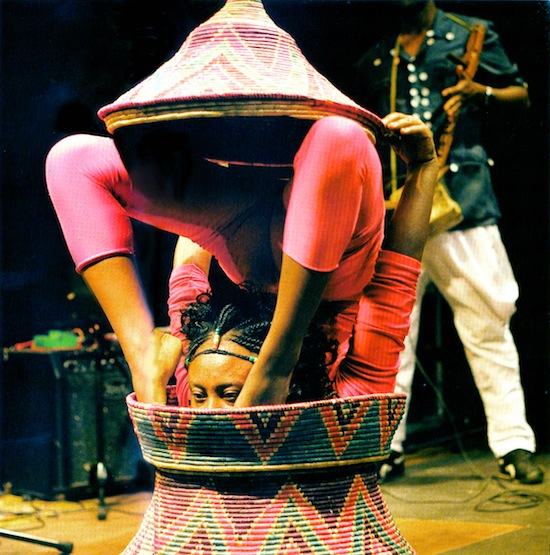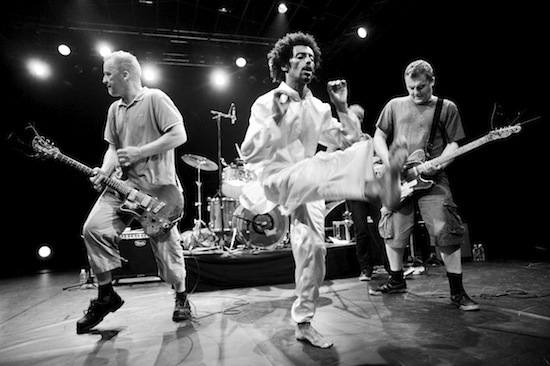Throughout most of their remarkable 37-year lifespan, The Ex have wished to avoid being defined by genre, style or subculture. Big whoop – so does nearly every band, especially ones with a guitar/bass/drums/vocal nucleus. Very, very few other groups actually put in the groundwork, and sufficiently open their ears, like this Dutch quartet do to justify such evasion.
If the present-day lineup of Terrie Hessels, Katherina Bornefeld, Andy Moor and Arnold de Boer want to call their inspirational sharp-angled clang ‘Ex-music’, in the knowledge that for the uninitiated this will invite more questions than it answers, then godspeed. Questioning, and questing, has been forever what The Ex do. In their early years, forming in Amsterdam circa 1979, they were a punk band – one in step with the emergent anarcho movement, playing squats and releasing benefit singles for El Salvador.
Already, their concerns stretched beyond the immediate domestic scene, and while soap & spikes sorts raising money for countries they’d never visited were abundant in the early 80s, The Ex also toured Europe relentlessly throughout the decade, including Eastern Europe when and where it was possible. As far back as 1984, they met an Iraqi band called Awara and recorded a single together – ‘Enough Is Enough’ features some boisterous Kurdish folk violin. Punk bands just didn’t do this at the time. Or since, really.
Latterly, The Ex have become associated with various performers from Africa, and particularly Ethiopia. The seeds for this were sown in 1996, which Hessels spent travelling through 21 African nations; the following year, The Ex toured with Djibril Diabate, a Malian kora player. Their first Ethiopian visit came in 2002, with esteemed Dutch free improv drummer Han Bennink, and at pretty much any given moment since there’s been some sort of cross-continental Exthiopian activity taking place, or in the works. Many of the releases on Hessels’ label, Terp Records, have been given over to Ethiopian performers from both the archives and the newer crop.
Probably The Ex’s most frequent sonic compadre – nearly a hundred concerts together! – was Gétatchèw Mèkurya, a saxophonist from the Ethiopian capital of Addis Ababa. A veteran of various house bands since the 1950s, his unrestrained, lyrical playing style has been compared to Ornette Coleman and other American free jazz progenitors – none of whom were on Mèkurya’s radar at all, by his own account. Welcoming beyond obligation to these strangers from the Netherlands when they sought him out in 2004, it was Mèkurya who suggested they record an album together: 2006’s Moa Anbessa, by which time he was a septuagenarian.
If Gétatchèw Mèkurya’s death earlier this year closed a chapter on Ethiopian music, it certainly doesn’t shut the book. This will be demonstrated at Le Guess Who? – located in Utrecht, and one of a great many extraordinary Dutch festivals – with The Ex Festival, a multifaceted four-hour improvshow on Sunday 13 November. It will feature six Ethiopian musicians (some of whom play in Fendika, an Addis band who also perform with The Ex on Sat 12) and off the hook acrobatics from Circus Debre Berhan.
Jazzers, especially, may be au fait with other names on the lineup. As well as the aforementioned Bennink, there’s Norwegian percussionist Paal Nilssen-Love and Chicagoan Ken Vandermark, both of who featured in scorching Ex spinoff Lean Left. British improv mainstay John Butcher crops up on various Ex-related releases down the years. Zeais what Arnold de Boer calls himself when he’s not fronting The Ex. It amounts to a legitimately amazing prospect, and contender for jewel in the crown of a festival which has been programmed with unusual care and respect for its audience’s curiosity.
The four Ex members sat down and collectively answered my questions about their Le Guess Who? session, the musicians taking part and the current Ethiopian scene.
So, we should talk about The Ex Festival first of all, and specifically the Ethiopians performing. Can you tell me a bit about Fendika, all of whom play the Sunday improv session as well as featuring with you guys the evening before?
The Ex: Fendika are a band that originated in the Fendika Azmari Bet, the traditional nightclub that is ran by Melaku Belay [also a dancer in Fendika]. It’s a place where every night the traditional musicians play and dancers dance, with a lot of improvising and performing right in front and in between the guests. They are all from Addis Ababa. With The Ex, we have played with Fendika since 2013. We have done a few tours together, too, including one with Circus Debre Berhan.
Are you expecting the session to have loads of musicians on stage all the time, or do you want to make sure everyone’s individual sound can be heard?
TE: When The Ex and Fendika play together it starts with only The Ex, then Fendika joins and we play a whole set together. Then in the end, Fendika takes over and The Ex leaves, and the room turns into a traditional Ethiopian nightclub.
Are you often listening to music with collaborating at the back of your mind these days? For example, because of this interview I’m listening to Endris Hassen playing the masinko, or Zerfu Demissie’s begena, and thinking, ‘Yeah, this would sound cool with The Ex’s guitars!’
TE: It does not start like that. The connections are very personal. Zerfu is a whole different chapter – we could never play with Zerfu since his music is traditional religious music basically only played in Ethiopia during fasting time. That music has its own universe.
Do you always build a relationship with musicians before asking them to play with you, or ask them first and become friends later?
TE: We shared the stage with Fendika in 2009 when we were touring in France. We already knew Malaku Belay, since he was touring with us on the Getatchew Mekuria and The Ex tours. The next time we went to Ethiopia we met Nardos [Terfaw, vocals], Endris [Hassen] and Mesale [Legesse, kobero] again in Addis and we heard them play again. We invited Fendika for our 33 ⅓-year celebration and for The Ex Festival tour in 2014. We became very good friends and it was out of enthusiasm about each other’s music that we started playing songs together and recorded a seven-inch together too.
In fact, I know Endris has played with you guys before, and he seems to play in some other bands like Misto Misto and Kazanchis Trio.
TE: Endris is an amazing masinko player who improvises a lot too. There is a Fendika album on the way where you will hear masinko (Endris), koboro (drums, Mesale) and voice (Nardos and Melaku). It’s the best playing of Endris I have heard so far and all focus is on them. The album [Birabiro] will be just in time for the tour!
Zerfu Demissie’s music is very interesting to listen to in the context of this session – it sounds very improvised and ‘free’, but also solitary and… mournful. Plus it’s from a spiritual, Orthodox Christian tradition. How do you think it will fit in with the other Ethiopian performers, who to me seem to have a different vibe?
TE: The evening builds up. Fendika always starts their concert with a religious song to ask God permission to be able to say anything the want and have to say. It all connects wonderfully.

You’ve performed with the Circus Debre Berhan before – Terrie’s description underneath this clip he uploaded to YouTube sounds like it was basically unplanned. Are the CDB performers improvisers in the same way as the musicians in this session, would you say?
TE: The circus is well prepared and rehearsed and has to stick to their performances, but of course the whole thing of keeping balance is very closely connected to improvising too, I believe.
Do you have previous experience of combining music and movement with The Ex?
TE: Yes! The Ex has been performing with amazing dancers like HisakoHorikawa, from Japan. Amsterdam has a great school of improvised dancing. Andy [Moor], especially, performs often with dancers since he is almost married to one, Valentina Campora. And then we have played a lot with Malaku Belay – he improvises a lot too and it’s fantastic.
Melaku is a dancer, but he seems to do so much more than that, it’s hard to know where to start with him. Could you briefly describe how you met Melaku?
TE: When The Ex played with Gétatchèw Mèkurya in Ethiopia for the first time, in 2006, a young dancer came to the stage and demanded space on stage for dancing since this music would not do in Ethiopia without dancing. It was Melaku and he was amazing. From that point we invited him to join on the tours. And the rest is history.
Were the non-Ethiopian musicians at The Ex Festival chosen either because of existing connections to Ethiopia (e.g. Paal and Han) or because there’s something in their music that has a similar spirit?
TE: It does come down to that, yes. They do all have some connection with Fendika and that’s great for the improvising sessions.
What’s the story with Api Uiz [an extraordinary trio from Bordeaux, France who are something like a cross between Guttersnipe, Konono No.1 and the Cardiacs; the only people on The Ex Festival lineup to be performing as a band]? Are they as mysterious and hidden away as they seem to me?
TE: You have to listen to Api Uiz now. Stop reading my answers. But more important, you have to come and see them or organise a show for them in your garage. You will understand Tati’s movies better after seeing Api Uiz play. It will make you a more complete person.
Getachew Mekurya died this year, which is of course very sad – has this had an impact on the music scene as you see it?
TE: We miss Getatchew a lot. He was a huge inspiration for many people, also for the young students in Addis who never saw him play until we came and played with him at the university and at the Alliance Francaise.
I interviewed you for Plan B magazine – I think in 2008 – mostly about Ethiopian music and your experiences with the musicians from there. What would you say has changed in the last eight years – do you still visit regularly, are the same faces still around, have attitudes or opportunities changed for artists there? And are cassettes still a big way of listening to music there?
TE: We have done workshops at the music schools with all the different musicians we have brought to Addis, and it has been great. Playing music and exchanging ideas with musicians with such a different background is great. It’s a self-created privilege. Sometimes we envy ourselves.
If you want to get great music when you are in Addis, you might still find some cassettes, but I advise you to walk around and listen. The people in the shops are playing music from desktop computers full of MP3s. Bring an empty pen-drive and ask them to load a selection of their collection onto it. Go through it with them, it’s fun. And then pay. Enjoy.
For more details on LGW/Ex Festival check their official site


